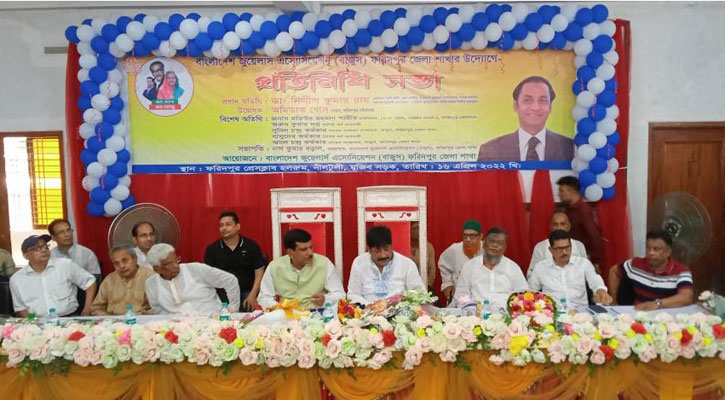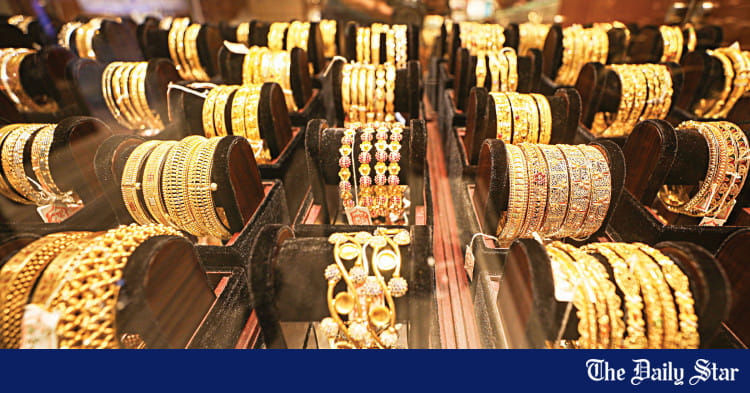Saif
Senior Member
- 13,736
- 7,407
- Origin

- Axis Group

Bajus unhappy over imposition of higher tax, VAT on jewellery in proposed budget
Published :
Jun 09, 2024 21:30
Updated :
Jun 09, 2024 21:38

Jewellery traders on Sunday expressed dismay over the proposed national budget for FY2024-25, as it has failed to meet their expectations in encouraging the jewellery business in the country.
The 5 per cent VAT imposed on the sale of gold ornaments should be reduced to 3 per cent, they demanded. If implemented, Tk 10 billion of revenue will be collected from the jewellery sector, the jewellers said.
"The proposed budget has failed to meet the expectations of the jewellery industry. Although the NBR has repeatedly promised to address the problems and meet the demands of traders in the pre-budget meetings, there is no reflection of it in the proposed budget," said their association at a news conference in the city.
Bangladesh Jeweller's Association (Bajus) organised the conference and demanded their already proposed 15-point demand needs to be met in the proposed budget.
Bajus President Sayem Sobhan Anvir, Bajus General Secretary Badal Chandra Roy, Bajus spokesperson Dr Dilip Kumar Roy were present at the conference.
Although it has been repeatedly said that the manufacture and export of gold bars, coins and gold ornaments through legal channels will be encouraged, the import of raw materials and machinery related to this sector has been burdened with unequal duty rates, it said.
An unplanned source tax burden has been imposed on traders. The price of gold in our local market is always Tk 8-10 thousand higher than in the international market. One of the reasons for this is the unbearable duty rate on the import of raw materials and machinery.
Regarding the baggage rule in the proposed budget, Finance Minister Abul Hassan Mahmood Ali said, "In order to evade customs duty, passengers arriving from Middle Eastern countries bring gold ornaments with light designs on 24-carat jewellery. In that case, I am proposing to add the definition of gold ornaments in the case."
Bajus fully agrees with this statement of the finance minister, it said.
Currently, due to inflation and the dollar exchange rate, it costs around Tk 1,17,177 to buy 1 bhori of jewellery gold. Adding Bajus' fixed minimum wage of Tk 7,031 and 5 per cent VAT of Tk 6,210 brings the total price to Tk 1,30,418.
To read the rest of the news, please click on the link above.
Published :
Jun 09, 2024 21:30
Updated :
Jun 09, 2024 21:38
Jewellery traders on Sunday expressed dismay over the proposed national budget for FY2024-25, as it has failed to meet their expectations in encouraging the jewellery business in the country.
The 5 per cent VAT imposed on the sale of gold ornaments should be reduced to 3 per cent, they demanded. If implemented, Tk 10 billion of revenue will be collected from the jewellery sector, the jewellers said.
"The proposed budget has failed to meet the expectations of the jewellery industry. Although the NBR has repeatedly promised to address the problems and meet the demands of traders in the pre-budget meetings, there is no reflection of it in the proposed budget," said their association at a news conference in the city.
Bangladesh Jeweller's Association (Bajus) organised the conference and demanded their already proposed 15-point demand needs to be met in the proposed budget.
Bajus President Sayem Sobhan Anvir, Bajus General Secretary Badal Chandra Roy, Bajus spokesperson Dr Dilip Kumar Roy were present at the conference.
Although it has been repeatedly said that the manufacture and export of gold bars, coins and gold ornaments through legal channels will be encouraged, the import of raw materials and machinery related to this sector has been burdened with unequal duty rates, it said.
An unplanned source tax burden has been imposed on traders. The price of gold in our local market is always Tk 8-10 thousand higher than in the international market. One of the reasons for this is the unbearable duty rate on the import of raw materials and machinery.
Regarding the baggage rule in the proposed budget, Finance Minister Abul Hassan Mahmood Ali said, "In order to evade customs duty, passengers arriving from Middle Eastern countries bring gold ornaments with light designs on 24-carat jewellery. In that case, I am proposing to add the definition of gold ornaments in the case."
Bajus fully agrees with this statement of the finance minister, it said.
Currently, due to inflation and the dollar exchange rate, it costs around Tk 1,17,177 to buy 1 bhori of jewellery gold. Adding Bajus' fixed minimum wage of Tk 7,031 and 5 per cent VAT of Tk 6,210 brings the total price to Tk 1,30,418.
To read the rest of the news, please click on the link above.








































